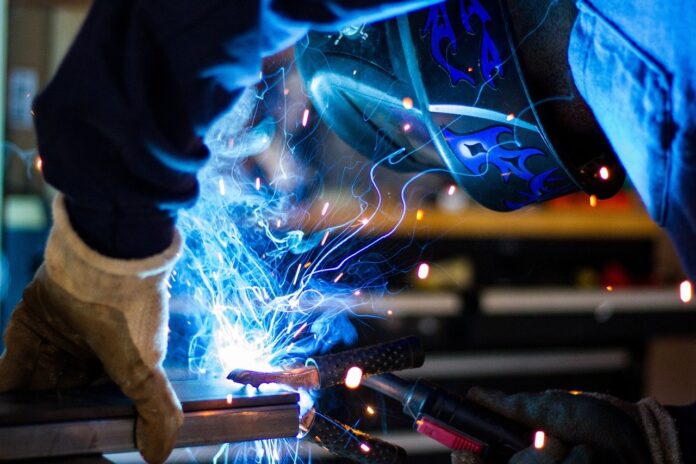A welding business needs many types of insurance, with core components of cover being public liability insurance and employers’ liability insurance. Most welding businesses will also want to consider cover for tools, equipment, other business property and even personal accident cover. These will be discussed below.
Due to the risks involved in running a welding business, insurance is not cheap; even a small welding business can pay more than £1,000 a year for public liability insurance, tools cover, personal accident and employers’ liability for just one employee. (Read more about welding business insurance costs in research by NimbleFins.)
Welding business insurance
Welding business insurance starts with public liability and employers’ liability insurance, but other types of insurance might be needed as well. Here is a list of common types of business insurance that a welding business might need:
- Public Liability: Protects if third parties suffer damages or injury and blame the welding business
- Product Liability: Protects against damages or injuries due to the work produced
- Employers’ Liability: Protects against a work-related employee injury or illness
- Personal Accident: Offers financial protection if a welder is unable to work due to illness or injury (e.g. temporary payments to help replace lost income)
- Business Use/Commercial Vehicle: Personal or work-owned vehicles must have the correct insurance to cover work-related driving
- Tools and Equipment: Protects welding tools that are stolen or accidentally damaged in a covered event, like a fire
Public liability insurance for welders
Public liability insurance for welding companies and sole trading welders protects if a third party (e.g. a client) accuses the welding business of negligence that results in personal injury or property damage. When a business causes property damage or injury to a third party, the third party can take legal action against the business (in this case, a welding business) and sue for compensation.
For example, consider the situation where a client’s building is damaged by fire if welding equipment is accidentally left on after hours. That would certainly end in a compensation claim brought by the client as they seek funds to pay for repairs to the building. A public liability insurance policy can help cover costs from legal expenses and compensation the welding business needs to pay as a result.
Without a public liability insurance policy in place, the welding business would need to cover these costs, which can be significant. What if the fire burnt down an entire home? Rebuild costs can run into the hundreds of thousands of pounds for a typical UK home. And legal expenses can easily run into the tens of thousands of pounds to defend against a claim. This could cause financial ruin for a sole trader or larger company, which is why welding business consider public liability insurance to be a key risk management tool.
Even in situations where the welding business has done nothing wrong, public liability insurance can come in handy. It will cove legal costs of frivolous claims as well, if a client or other third party comes after a welding business for an unfounded claim of damage or injury.
Do welders need public liability insurance?
Yes, sole trader welders and other welding businesses in the UK should be protected by public liability insurance. Welders who are employees of a business should be protected by the business’s public liability insurance policy; but all welders are advised to confirm this before starting work.
Do welders need employers’ liability insurance?
A sole trader welder does not need employers’ liability insurance, but nearly all welding businesses with employees will need employers’ liability insurance. Employers’ liability insurance protects employees and businesses financially if an employee suffers a work-related injury or illness.
According to the Health Safety Executive (HSE), welding fume can cause lung cancer. While businesses must put controls in place to guard against employees developing occupational lung diseases, for instance by limiting the time spent welding and either extracting air outside the workspace or filtering air that is discharged into the workspace to remove particles.
While employers’ liability insurance will cover work-related illness or injury claims, business must understand that they’re still obligated to ensure a safe work environment for their employees. If they don’t do so, their insurance company can come after them for costs associated with any claims.
Welding business insurance cost
According to research by NimbleFins, a small welding business can expect to pay from around £264 for a basic public liability insurance policy with £2 million of coverage. The cost for a welding business is more than 2X the average cost of public liability insurance for a typical small business in the UK across all industries. fume can cause lung cancer
Due to the risks involved, a welding business may decide they need a higher level of cover. A plan with £5 million would start from around £338 per year.
Employers’ liability (EL) insurance is quite costly for a welding business as well, due to the risks mentioned above. For just one employee, a welding business could be quoted over £600 a year for EL insurance. To protect employees, a welding business might also want to buy personal accident insurance, which can run at over £100 annually.







